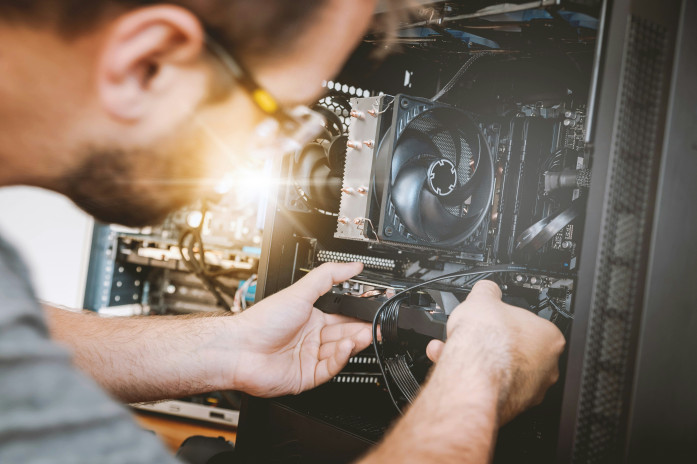from Digitunity
Digitunity Reports Significant Growth in Device Distribution for 2023-2024
Connecting technology donors with recipients, the nonprofit tackles misconceptions about the reliability of refurbished computers.
NORTH CONWAY, NH / ACCESSWIRE / May 29, 2024 / In an era where digital connectivity is increasingly essential, many individuals still face significant obstacles in accessing connected large-screen devices. Digitunity has been at the forefront of addressing this issue for the past four decades. Between 2023 and March 2024, the organization made substantial progress by distributing nearly 55,000 computing devices, with a total recoverable market value of approximately $4.1 million, to 227 nationwide nonprofit organizations committed to assisting those in need.

According to estimates, the donation of these devices conserved sufficient energy to support nearly 4,545 U.S. households for a year, mitigated greenhouse gas emissions comparable to removing over 2,672 cars from circulation, and prevented solid waste equivalent to that generated by 5,229 households by repurposing existing computing technology to assist those in need. Despite these achievements, outdated stigmas and misconceptions surrounding gently used computer donations persist.
More than 36 million Americans have no personal computer at home, and millions of households need multiple devices to give the family vital access to education, telehealth, and employment services. With refurbished computers donated by businesses and individuals, Digitunity, the national nonprofit working to make sure everyone has access to a computer, addresses this need but still finds people have misconceptions about the value that donated and reused technology can provide.
Susan Krautbauer, Senior Director of Advancement and a veteran of the technology industry at Digitunity, outlines and dispels five common stigmas about refurbished computers: 1) they are just old used devices, 2) they are damaged or defective, 3) they are outdated and slow, 4) they are less reliable than new ones, and 5) they are risky to purchase and don't provide good value. By addressing these misconceptions, Digitunity aims to increase the adoption of these devices, benefiting more individuals and families by proving that refurbished computers are a viable and valuable option.
A refurbished computer is not the same as one that has been used, nor does it necessarily mean it has been damaged or defective. Refurbished computers are thoroughly tested, repaired, and updated to perform like new, and are often backed by warranties to ensure reliability.
It is not uncommon for refurbished devices to be relatively new - typically three to five years old. Typically, refurbished computers are sourced from major computer manufacturers and maintained on recommended schedules by businesses, schools, or governments. With rigorous testing, repair, and certification processes, refurbished computers can be as reliable as new ones, high-quality workhorses that can still deliver top-notch performance.
Computers that are refurbished are not risky or defective. They are sometimes returned products that reputable suppliers fully repair and test to ensure they are functioning perfectly. These devices are sourced from approved donors and undergo rigorous testing, repairs, and updates before they are distributed to recipient organizations by reputable vendors or Digitunity's trusted network.
New computers depreciate 30% to 70% in value in less than a year, whereas refurbished computers provide all the features and performance for a significantly reduced price. A refurbished product is often less expensive than buying a new one and can meet the user's needs without compromising quality.
In addition to reducing e-waste, refurbished devices keep devices out of landfills, which reduces carbon footprints and environmental impacts. According to the Global E-Waste Statistics Partnership, 53.6 million metric tons of electronic waste were generated worldwide in 2019 but only 17.4% of them were collected and recycled.
By ensuring that manufacturers provide access to repair information, materials, and software, 30 states have now passed or introduced "Right to Repair" legislation, a powerful ally against the stigma associated with refurbished computers. This initiative promotes the rights of consumers to repair and modify electronic devices without being restricted by manufacturers' policies, which limit access to tools, parts, and information.
"Refurbished computers serve as powerful tools for environmental sustainability and social empowerment," says Susan Krautbauer. "They not only extend the life of these devices but also significantly diminish e-waste and conserve valuable resources, reducing the overall environmental impact of technology." To learn more about how Digitunity connects donors of computers with community-based organizations that distribute them to individuals in need, visit digitunity.org.
About Digitunity
Digitunity is a national nonprofit organization with a mission to make owning a computer possible for everyone. Engaged in advancing digital equity for nearly forty years, Digitunity generates and places donated computers with organizations serving people in need, supports a national practitioner network, and advises states, cities, and coalitions on strategies to meet the ongoing device needs of people impacted by the digital divide.
Contact Information:
Maria Penaloza
maria.penaloza@newswire.com
SOURCE: Digitunity
View the original press release on newswire.com.

